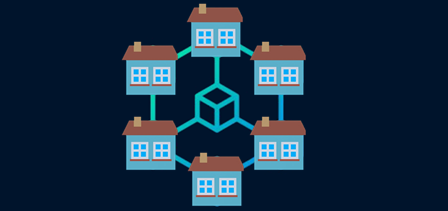
The Enterprise Ethereum Alliance (EEA) released a paper about the rising use of blockchain technology by those in the real-estate community, with a particular emphasis on tokenization, land registries, and standardizing real-estate data.
Back in 2009, an anonymous coder released “Bitcoin,” the world’s first decentralized cryptocurrency, and it hit the world by storm. The technology, known as “blockchain,” allowed people to make and validate transactions without ever having to go through an intermediary, such as a bank. Put simply, the technology allows for the recording of transactions between two parties on a distributed ledger across a network of users. By design, each block carries a timestamp of when the transaction was made and that data is immutable.
While the tech community originally envisioned that only monetary transactions would be conducted, blockchain has evolved to fit into a plethora of different areas and industries, such as healthcare, music, publishing, and real estate.
Dominated by large firms and organizations, the investment market for real estate has been bogged down by “transactional friction and opacity,” according to the report. Traditionally, the industry has relied upon various intermediaries, of all sorts, to properly transact and record ownership rights, and transactions.
Indeed, blockchain hopes to change all of that by making purchases and investments more “liquid” and more readily documentable and manageable. “The benefits will open up markets for new investors and let a greater number of parties manage ownership, liquidity, and risk much more effectively,” the EEA points out.
The idea of tokenization allows individuals or investment firms to buy smaller portions of a property building, or an investment block, if there is a lack of capital, or, if a firm does not want to purchase and manage a commercial or residential property.
It can also come in handy for a development project, where it might be feasible to sell fractions. The beauty of tokenizing real-estate assets is that it allows for smaller or individual investors to take advantage of a market which has, previously, been impenetrable for many.
Further, blockchain also has the potential to be used in land registries, as much of that information has historically been hard to track and publically access. The EEA maintains that the technology has the potential “to shorten a normally lengthy process of recording and transferring titles while offering transparency and eliminating the need to trust a centralized party.”
Several companies and municipalities around the world have already conducted trial runs. In January, 2019, the Wall Street Journal covered how one town in Vermont partnered with a blockchain firm to replace the city’s system for recording property transactions.
Lastly, the paper notes how the real-estate ecosystem is full of disparate real-estate networks with “little to no interoperability between them or other systems.” According to the EEA, agents and firms struggle to attract buyers and sellers to the right property listings because there are so many “systems used internally within a firm, as well as external services locally, regionally, nationally and internationally.”
Blockchain could solve that problem by allowing firms to share their data with one another without ever relinquishing ownership. Property particulars can be streamlined by using an entity-attribute model and by adopting shared ledgers and data schemas.
The EEA cites this example: “[I]f Firm A wants to share property data with Firm B regarding 123 Apple Street, Firm A could encrypt the data for the property and post it within a blockchain network. Firm A can then share the encryption key with Firm B, giving Firm B read-access to 123 Apple Street.”
For many, blockchain technology will be a fundamental shift in how a real-estate transaction is processed, from the listing of an asset to deed conveyance and ownership. In the coming years, intermediaries may well become obsolete, and digital ledgers will likely reign supreme.
